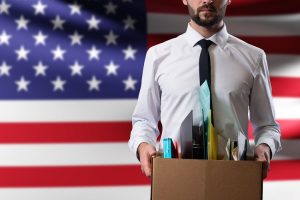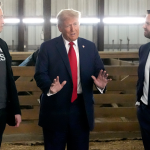
June 6, 2025
Are Software Jobs Collapsing?
The image below, which appeared in the Financial Times, has been gaining traction on the Internet because it seems to show what people in the software industry fear most: The introduction of new groups of AI models has collapsed the software industry. Beginning in 2022 and gaining momentum through 2023, the tech industry experienced a…

June 5, 2025
Reclaimed Words and a Meta Oversight Board Decision Reveal Problems with Policing Online Hate Speech
To appreciate the complexities of policing online hate speech that underlie an April summary decision by Meta’s Oversight Board, let’s start with a musical detour through a 2017 US Supreme Court opinion called Matal v. Tam. The Court faced the First Amendment question in Matal of whether the US Patent and Trademark Office (PTO) could…

June 4, 2025
Expect an AI Shock to Change the Job Market, Not Destroy It
In a Wall Street Journal op-ed, “The Real Story of the ‘China Shock‘,” economists James J. Heckman (a Nobel laureate at the University of Chicago) and Hanming Fang (University of Pennsylvania) argue that the turn-of-the-century trade disruption primarily shifted jobs from one region to another rather than eliminating them nationwide. Moreover, they contend that Chinese…

June 4, 2025
What is a “Worst Case” Climate Scenario?
The implausibly extreme and hugely popular climate scenario RCP8.5 made it into President Trump’s executive order last week on “Restoring Gold Standard Science.” Ironically, the Trump administration’s characterization of RCP8.5 did not quite reach the “gold standard,” and maybe not even a “bronze standard. “ The EO states: [Federal a]gencies have used Representative Concentration Pathway…

June 4, 2025
The Intelligence of Things Is Here—Reflections from Google I/O 2025
Recently, I had the privilege of attending Google’s I/O developer conference with colleagues Will Rinehart and Shane Tews. The event featured (literally) 100 AI announcements and live demonstrations, including Waymo and Wing drone delivery. Reflecting on the two days, several themes emerged reshaping technology and society. AI Integration Everywhere Analyst Ben Thompson said he was…

June 4, 2025
What Economists Are Learning About AI, Jobs, and Local Economies
Conventional wisdom about artificial intelligence runs in two directions—utopian and dystopian. On one hand, we’re told that AI will usher in explosive productivity, endless efficiency, and new industries we can’t yet imagine. On the other hand, there are fears that machines will hollow out middle-class jobs, exacerbate inequalities, and perhaps even make large swaths of…

June 3, 2025
The Politicization of Intelligence, Part 2
In Part 1 of this two-part series I discussed the National Intelligence Council (NIC) and its role iin synthesizing and summarizing intelligence from across the U.S. government’s intelligence gathering agencies. Today, in Part 2 I take a broader look at the challenges of securing reliable intelligence in an environment characterized by ever-present politics. Intelligence in decision making “includes…

May 30, 2025
A Bitter Pill to Swallow: American Drug Shortages
While drug pricing has been a consistent focus for policymakers concerned about access to medicine, another significant barrier to care has grown: drug shortages. Drug shortages have become more prevalent, with causes ranging from problems at manufacturing facilities, compliance with regulation to unpredictable demand. An insufficiently profitable market, particularly for complex generic medicines, discourages investment…

May 30, 2025
Atlantic Hurricanes Preseason 2025
There has been no tropical cyclone of hurricane strength anywhere in the Northern Hemisphere so far in 2025. If we get to June 5th — which looks quite possible if not probable — then 2025 will have the latest date on record (since 1970) for the first NH hurricane, breaking the record of Ava, which…

May 30, 2025
A Tale of Two Satellite Broadband Policies: The US and South Africa
On Tuesday, technology writer Patience Haggin claimed that in the US, “rural internet is still so bad, some states are turning to outer space.” The article referred to the growing number of states rolling out satellite subsidies “that could be a boon to Elon Musk’s Starlink and another nascent service from Amazon.” These subsidies include…